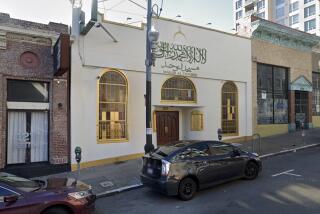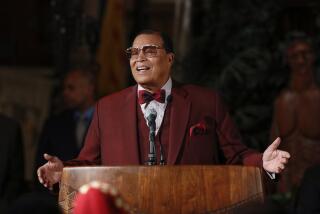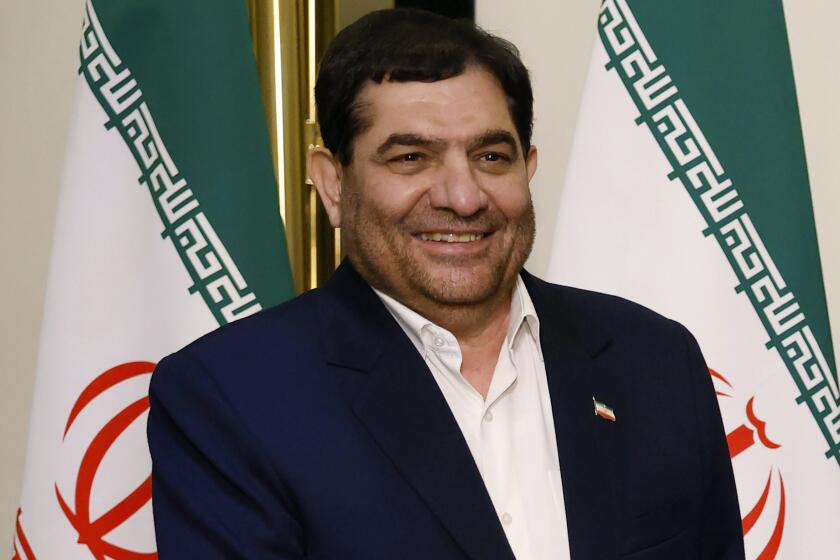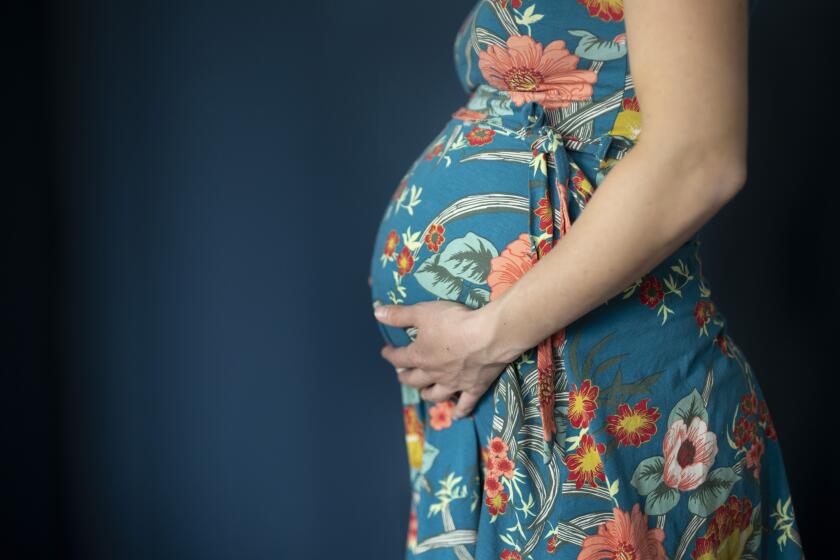Islamic Cleric Arrested Amid Cheers and Jeers : Terrorism: Sheik’s followers are linked to bomb plots. Standoff draws shouting match between Muslims, Jews.
After a tense 20-hour standoff, Sheik Omar Abdul Rahman, the fiery Islamic cleric whose followers have been arrested in the World Trade Center bombing and for alleged plots to blow up the United Nations and other New York landmarks, walked out of a red brick Brooklyn mosque Friday evening and into the arms of federal immigration agents.
The controversial religious leader emerged surrounded by cheering supporters who chanted: “God is great!” He walked across a police line and away from the jeers of angry Hasidic Jews who shouted: “Go to hell!” and “Drop dead!”
In a city increasingly wary of international terrorism, police emergency vehicles and federal government cars filled the street in front of the mosque. Dozens of police officers kept growing crowds of spectators behind wooden barricades. FBI and immigration agents directed the politically sensitive operation from a command post set up in a nearby firehouse, where the sheik was formally taken into custody.
A police spokesman said the bearded cleric, dressed in white robes and a red cap, was taken to a federal facility in Otisville, N.Y., about 75 miles northwest of Manhattan.
He was arrested for violating U.S. immigration laws and not in connection with terrorist acts in New York. The action brought to a close an intense debate here and in Washington over how to treat the 55-year-old blind and diabetic sheik. Some have argued that his presence and preachings in this country have fueled violence. Others have maintained that he is being politically persecuted.
Abdul Rahman is appealing a decision to deport him based on evidence that he entered the United States illegally in 1991. He was ordered deported in March because he allegedly lied on immigration forms when he failed to disclose that he was a bigamist and had been convicted in Egypt of a check fraud charge.
The Clinton Administration decided Thursday to take the sheik into custody while his appeal to remain in the United States is pending. Federal sources said the decision was made after it appeared that the driver of his van tried to evade government surveillance Wednesday night.
“That was the last straw,” one government source said.
Throughout most of the day Friday, it seemed as though the cleric, ensconced inside the Abu Bakr Mosque with hundreds of his followers, was not coming out--except on his own terms. Inside the mosque, he conducted services and gave a goodby speech that left many of his followers in tears.
“I might not stand in front of you again,” he told his supporters. “We are not conspiring against America, even though we disagree with American policy. We want to give a civilized appearance to Islam.”
Negotiations over his surrender, which earlier in the day seemed routine, at one point appeared to be collapsing over the issue of where the Muslim leader would give himself up to the U.S. Immigration and Naturalization Service.
According to government officials and sources close to Abdul Rahman, he vehemently insisted that he be allowed to travel to Newark, N.J., and surrender to authorities in his home state. But federal agents wanted him to leave the mosque and report directly to an INS facility in New York.
The sheik’s lawyers met with government officials throughout the day. At 6 p.m., Michael Warren, one of his attorneys, announced on the street in front of the mosque that the cleric was ready to come out.
“It is something he (Abdul Rahman) can live with. . . . We are ready to proceed,” Warren said. Moments later, the sheik stepped through the mosque’s white front door.
His presence was greeted with relief by law enforcement officials, who had said privately that they had no intention of storming the house of worship. But the prospect of a standoff on a Fourth of July weekend with a militant religious leader surrounded by hundreds of supporters clearly was worrisome in a city with frayed nerves since the Feb. 26 trade center bombing that killed six and injured more than 1,000.
Only the day before, the Brooklyn-Battery Tunnel was closed for more than four hours during the evening rush hour while police gingerly removed a package thought to be a bomb. It turned out to be a parcel of rope.
In what investigators allege is the latest terrorist plot, nine suspects are accused of planning to bomb other New York tunnels and buildings.
Against that background, the negotiations with the sheik’s representatives took on added urgency.
Mohammad T. Mehdi, Abdul Rahman’s spokesman and president of the American-Arab Relations Committee, insisted that the cleric was prepared to remain in the mosque unless his demands were met.
“Either they will forcibly go in there and get him or he will stay in there,” Mehdi said.
Mehdi said that the sheik wanted to surrender in Newark for several reasons. Besides the fact that the cleric lives in New Jersey, he said, the sheik believed that if he turned himself in at the Manhattan immigration office, it might be seen as a victory for New York’s senator, Alfonse M. D’Amato.
The Republican senator was believed to be an assassination target in the latest alleged terrorist plot because he had advocated the death penalty in the trade center case and had been outspoken in his demand that the sheik be immediately jailed or ousted from the country.
In Washington, acting INS Commissioner Chris Sale said that Abdul Rahman’s immigration status was revoked because “it has been determined that it is no longer in the public interest for the sheik to remain at large.”
The sheik will remain in federal custody pending a final decision on the government’s effort to deport him.
An Egyptian national, who has advocated the violent overthrow of President Hosni Mubarak, the sheik first entered the United States in 1990 on a tourist visa issued in Sudan. He later obtained permanent resident status, but the INS moved in 1992 to rescind it. He then filed for asylum.
In Cairo, meanwhile, followers of the sheik threatened a worldwide bombing campaign if their spiritual leader was taken into custody.
The threats came during sermons delivered Friday at more than a dozen mosques controlled by the radical Muslim fundamentalist Gamaa al Islamiya, or Islamic Group, according to Egyptian news reports.
Mosque preachers accused the Egyptian government of cooperating with U.S. authorities to detain Abdul Rahman in the United States or force his return to Egypt.
More to Read
Start your day right
Sign up for Essential California for news, features and recommendations from the L.A. Times and beyond in your inbox six days a week.
You may occasionally receive promotional content from the Los Angeles Times.







